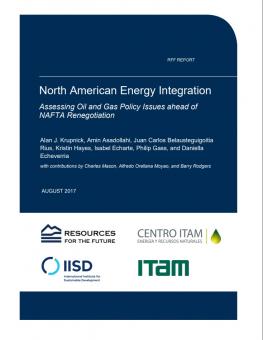
North American Energy Integration: Assessing oil and gas policy issues ahead of NAFTA renegotiation
Mexico, Canada and the United States stand to benefit from increasing energy sector interconnectedness and coordination. What key environmental and fiscal policy areas related to oil and gas development provide opportunities for further harmonization?
In a joint report by IISD, Resources for the Future (RFF) and Instituto Tecnológico Autónomo de México (ITAM), we explore opportunities and benefits associated with enhancing and aligning oil and gas sector environmental regulations and fiscal policies in Canada, the United States and Mexico.
The report contains extensive descriptions of existing policies, legislation, and regulations on transportation, climate change, royalties and fiscal structures, decommissioning and abandonment, water and environmental safety, as well as detailed discussions of harmonization opportunities in each of those areas.
Among key finding, the report notes:
- Simplifying some aspects of oil and gas fiscal policies could provide the public with transparency and fair returns while functioning more efficiently for the oil and gas sector.
- Defining what constitutes a subsidy to the oil and gas sector presents an important first step to their removal as part of a G20 commitment.
- While U.S. federal cooperation on regulating greenhouse gas emissions is unlikely in the short term, there are quite a few opportunities for subnational U.S. and Canadian governments as well as the Mexican government to explore harmonization.
- Opportunities may exist for the three countries to work together to set coordinated standards on well decommissioning, water use and disposal, and safety.
- Infrastructure siting processes should be improved and better aligned to decrease transaction costs and delays, as well as to better address national and cross-border environmental and indigenous concerns.
Participating experts
You might also be interested in
February 2025 | Carbon Minefields Oil and Gas Exploration Monitor
In January 2025, 77 oil and gas exploration licences were awarded in seven different countries, with Norway leading in terms of embodied emissions.
Reforming Environmentally Harmful Subsidies
This playbook offers a strategic framework for philanthropic organizations to understand, engage, and advance environmentally harmful subsidies reform as a critical avenue for sustainable environmental and economic transformation.
State of the Sector: Critical energy transition minerals for India
This report presents a comprehensive strategy for securing a reliable supply of critical energy transition materials (CETMs) essential to India's clean energy and low-carbon technology initiatives.
Fossil Fuel Subsidy Reform in Aviation and Shipping
Countries can address fossil fuel subsidies in aviation and shipping by changing legislation to allow for reform and introducing emission levies.